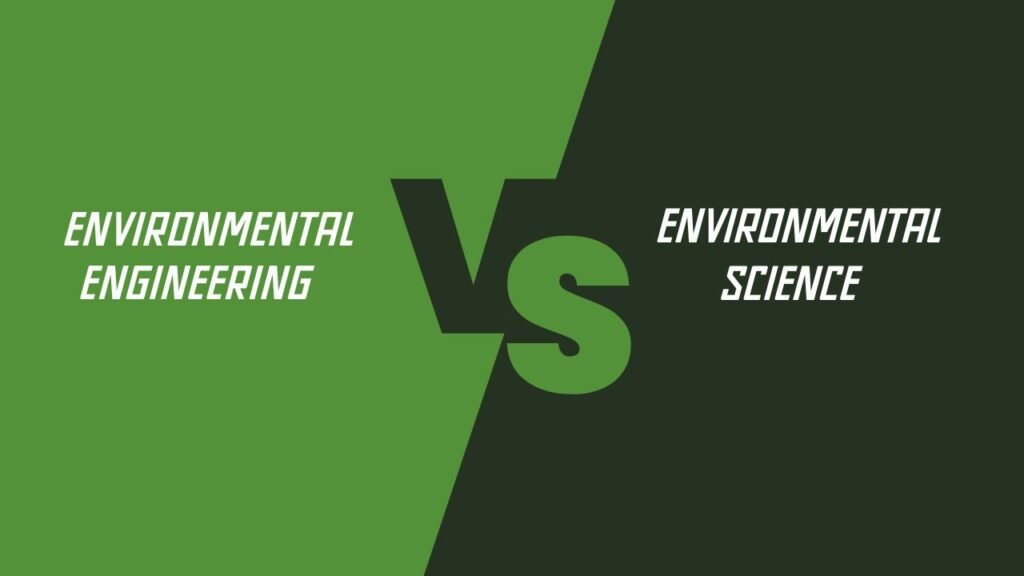Where to Study Environmental Engineering?
Introduction
Choosing where to study environmental engineering can significantly impact your future career. With the increasing importance of sustainability and environmental protection, finding the right program is essential. This article provides a comprehensive guide to help you navigate through the best universities, curriculum details, and other crucial aspects of pursuing a degree in environmental engineering.

Understanding Environmental Engineering
Definition and Scope
Environmental engineering is a branch of engineering focused on protecting the environment by reducing waste and pollution. It involves the application of scientific and engineering principles to improve the natural environment, addressing issues such as air and water quality, waste management, and sustainable development.
Role in Society and Industry
Environmental engineers play a critical role in society by designing systems and technologies that reduce environmental impact. They work in various industries, including water and wastewater treatment, air quality management, and environmental policy and regulation.
Importance of Environmental Engineering
Environmental engineering is crucial in addressing global challenges such as climate change, pollution, and resource depletion. By developing sustainable solutions, environmental engineers help ensure a healthier planet for future generations.
Skills Required for Environmental Engineers
Technical and Soft Skills
Successful environmental engineers possess a combination of technical and soft skills. Technical skills include knowledge of environmental regulations, proficiency in engineering software, and a solid understanding of chemistry and biology. Soft skills such as problem-solving, communication, and teamwork are equally important.
Top Universities for Environmental Engineering
Global Rankings and Notable Institutions
Some of the top universities for studying environmental engineering include:
- Massachusetts Institute of Technology (MIT)
- Stanford University
- University of California, Berkeley
- ETH Zurich
- Tsinghua University
These institutions are renowned for their cutting-edge research, state-of-the-art facilities, and comprehensive curricula.
Studying Environmental Engineering in the USA
Best Programs and Universities
In the USA, some of the best programs are offered by:
- MIT
- Stanford University
- University of California, Berkeley
- Georgia Institute of Technology
- University of Illinois Urbana-Champaign
These programs offer a blend of theoretical knowledge and practical experience, preparing students for successful careers.
Studying Environmental Engineering in Europe
Leading Institutions and Programs
Europe boasts several leading institutions for environmental engineering, such as:
- ETH Zurich (Switzerland)
- Technical University of Munich (Germany)
- Imperial College London (UK)
- Delft University of Technology (Netherlands)
- KTH Royal Institute of Technology (Sweden)
These universities offer innovative programs with a strong focus on sustainability and environmental protection.
Studying Environmental Engineering in Asia
Top Universities and Unique Offerings
Asia is home to top universities with unique offerings in environmental engineering, including:
- Tsinghua University (China)
- National University of Singapore (NUS)
- University of Tokyo (Japan)
- Seoul National University (South Korea)
- Indian Institute of Technology Bombay (India)
These programs often emphasize local environmental challenges and sustainable solutions.
Online Environmental Engineering Programs
Benefits and Top Online Schools
For those unable to attend in person, online environmental engineering programs offer flexibility and accessibility. Top online schools include:
- Johns Hopkins University
- Columbia University
- University of Southern California
- Arizona State University
- University of Illinois Urbana-Champaign

Online programs often mirror the rigorous curricula of their on-campus counterparts, providing a comprehensive education in environmental engineering.
Curriculum Overview
Core Subjects and Specializations
Environmental engineering programs typically cover core subjects such as:
- Environmental Chemistry
- Water and Wastewater Treatment
- Air Quality Management
- Environmental Microbiology
- Sustainable Design
Specializations might include water resources management, environmental policy, or renewable energy systems.
Environmental Engineering Internships
Importance and Opportunities
Internships are crucial for gaining practical experience and industry insights. Many universities have partnerships with companies and government agencies, offering students valuable hands-on opportunities.
Research Opportunities
Areas of Research and Leading Institutions
Research areas in environmental engineering include climate change mitigation, renewable energy, and pollution control. Leading institutions like MIT, Stanford, and ETH Zurich offer extensive research opportunities, often collaborating with industry and government agencies.
Environmental Engineering Labs and Facilities
Importance and Top Labs Worldwide
State-of-the-art labs and facilities are essential for practical learning. Top labs include:
- MIT Environmental Solutions Initiative
- Stanford Woods Institute for the Environment
- ETH Zurich’s Water Research Institute
These facilities provide students with the tools and technology to conduct advanced research and experiments.
Sustainable Practices in Environmental Engineering
Green Technologies and Innovations
Environmental engineers develop and implement green technologies such as solar and wind energy systems, sustainable waste management practices, and water conservation methods. These innovations are critical for promoting sustainability and reducing environmental impact.
Environmental Policy and Law
Courses and Importance
Understanding environmental policy and law is essential for engineers who aim to work in regulatory roles or influence environmental legislation. Courses often cover topics such as environmental ethics, international environmental law, and policy analysis.
Read more about US environmental policy
Career Opportunities in Environmental Engineering
Job Roles and Industries
Environmental engineers can pursue careers in various industries, including:
- Water and Wastewater Treatment
- Air Quality Management
- Environmental Consulting
- Government Agencies
- Non-Profit Organizations
Job roles range from environmental consultants and project managers to regulatory compliance specialists and researchers.
Salary Expectations for Environmental Engineers
Average Salaries and Factors Affecting Pay
Salaries for environmental engineers vary based on factors such as location, experience, and education level. On average, environmental engineers in the USA can expect to earn between $60,000 and $100,000 per year.
Professional Certifications and Licenses
Importance and How to Obtain
Certifications such as the Professional Engineer (PE) license or certifications from organizations like the American Academy of Environmental Engineers and Scientists (AAEES) can enhance career prospects and credibility.
Networking and Professional Associations
Key Organizations and Benefits
Joining professional associations such as the American Society of Civil Engineers (ASCE) or the Environmental and Water Resources Institute (EWRI) provides networking opportunities, access to resources, and professional development.
Environmental Engineering Conferences
Major Events and Benefits of Attendance
Conferences such as the International Conference on Environmental Engineering and the ASCE’s Environmental & Water Resources Congress offer valuable opportunities for learning, networking, and professional growth.
Continuing Education and Advanced Degrees
Master’s, PhD, and Post-Doctoral Studies
Continuing education through advanced degrees like a Master’s or PhD can open up higher-level career opportunities in research, academia, and specialized fields.
Choosing the Right Program for You
Factors to Consider
When choosing a program, consider factors such as curriculum, faculty expertise, research opportunities, location, and financial aid options.
Application Process
Requirements and Tips for Success
The application process typically involves submitting transcripts, test scores, letters of recommendation, and personal statements. Highlighting relevant experience and a strong academic record can increase your chances of acceptance.
Scholarships and Financial Aid
Finding and Applying for Support
Many universities offer scholarships and financial aid for environmental engineering students. Researching and applying for these opportunities can significantly reduce the financial burden.
Living Costs and Lifestyle
Comparing Different Locations
Living costs and lifestyle vary widely between locations. It’s important to consider these factors when choosing where to study, as they can impact your overall experience and financial planning.
Student Life in Environmental Engineering Programs
Clubs, Societies, and Activities
Participating in student organizations and activities can enhance your educational experience, providing opportunities for networking, leadership, and personal growth.
Success Stories and Alumni
Notable Graduates and Their Contributions
Learning about successful alumni and their contributions to the field can be inspiring and provide insight into potential career paths and opportunities.
Challenges in Environmental Engineering Education
Common Issues and Solutions
Challenges in environmental engineering education may include balancing theory and practice, keeping up with technological advancements, and addressing complex environmental issues. Solutions include hands-on learning, staying current with industry trends, and interdisciplinary collaboration.
Future Trends in Environmental Engineering
Emerging Areas and Technologies
Future trends in environmental engineering include the development of advanced water treatment technologies, renewable energy systems, and sustainable urban planning. Staying informed about these trends can help you remain competitive in the field.

FAQs – Where to Study Environmental Engineering?
What are the best universities for environmental engineering?
Some of the best universities include MIT, Stanford University, and ETH Zurich.
What skills are essential for environmental engineers?
Essential skills include technical knowledge, problem-solving, communication, and teamwork.
Are there online programs for environmental engineering?
Yes, top universities like Johns Hopkins and Columbia offer online programs.
What are the career prospects for environmental engineers?
Environmental engineers can work in various industries, including water treatment, air quality management, and environmental consulting.
How much do environmental engineers earn?
Salaries typically range from $60,000 to $100,000 per year in the USA.
What certifications are beneficial for environmental engineers?
Certifications like the Professional Engineer (PE) license and those from AAEES are beneficial.
Conclusion
Choosing where to study environmental engineering is a crucial decision that can shape your career. By considering factors such as program quality, location, and financial aid options, you can find the right fit for your educational and professional goals. The field of environmental engineering offers diverse and rewarding opportunities, contributing to the protection and sustainability of our planet.


